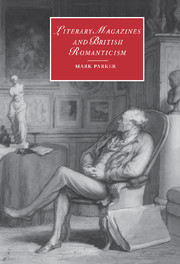Book contents
- Frontmatter
- Contents
- Acknowledgments
- Introduction: the study of literary magazines
- Chapter 1 Ideology and editing: the political context of the Elia essays
- Chapter 2 A conversation between friends: Hazlitt and the London Magazine
- Chapter 3 The burial of Romanticism: the first twenty installments of “Noctes Ambrosianae”
- Chapter 4 Magazine Romanticism: the New Monthly 1821–1825
- Chapter 5 Sartor Resartus in Fraser's toward a dialectical politics
- Conclusion
- Notes
- Bibliography
- Index
- Cambridge Studies in Romanticism
Chapter 2 - A conversation between friends: Hazlitt and the London Magazine
Published online by Cambridge University Press: 22 September 2009
- Frontmatter
- Contents
- Acknowledgments
- Introduction: the study of literary magazines
- Chapter 1 Ideology and editing: the political context of the Elia essays
- Chapter 2 A conversation between friends: Hazlitt and the London Magazine
- Chapter 3 The burial of Romanticism: the first twenty installments of “Noctes Ambrosianae”
- Chapter 4 Magazine Romanticism: the New Monthly 1821–1825
- Chapter 5 Sartor Resartus in Fraser's toward a dialectical politics
- Conclusion
- Notes
- Bibliography
- Index
- Cambridge Studies in Romanticism
Summary
There is no conversation worth any thing but between friends, or
those who agree in the same leading views of a subject. Nothing
was ever learnt by either side in a dispute.
“On the Conversation of Authors”William Hazlitt's days as regular contributor to the London Magazine were few, but they mark a turning point in his career. His most lasting work, the essays written under the pseudonym “Table-Talk,” were begun under Scott's tenure as editor. As in the case of Lamb's essays, Hazlitt's contributions stand in an active relation to the London, but the rhetoricity of the Table-Talk essays differs from that of the Elia essays. Despite their archaic style, Lamb's essays are much more the up-to-date commodity text than Hazlitt's. The diction may be quaint, but the Elia essays accord with the division of labor that marks the production of nineteenth-century periodicals. For all their jaunty modernity, Hazlitt's essays recall an older mode of production: the conversational relation between periodical and contributor established in the eighteenth century. To follow Hazlitt's career in the London under Scott, in the interregnum between Scott's death and the sale of the magazine to the firm of Taylor & Hessey, and under Taylor, is to examine the complex workings of a shifting array of factors – different conceptions of the magazine, different ideological tendencies, and different political commitments – in the production of meaning for Hazlitt's contributions.
- Type
- Chapter
- Information
- Literary Magazines and British Romanticism , pp. 59 - 105Publisher: Cambridge University PressPrint publication year: 2001



